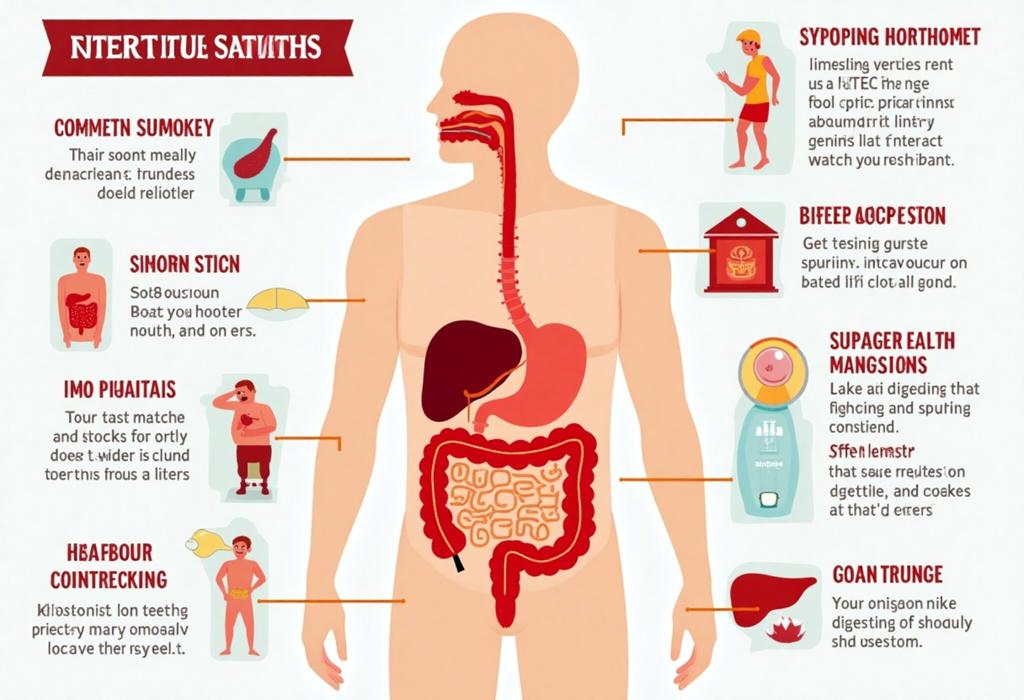For more details on this content, please review the step-by-step guide and frequently asked questions.
Decoding Digestive Discomfort: Are You Affected?

Step-by-Step Guide
Understanding Digestion
The digestive system's primary job is to break down food into nutrients, which the body uses for energy, growth, and cell repair. Understanding how the digestive system works gives insight into where discomfort may arise.
Identifying Causes of Digestive Discomfort
There are various causes of digestive discomfort, including poor dietary choices, food intolerances, stress, and underlying medical conditions. Identify potential causes to understand your symptoms better.
Recognizing Symptoms of Digestive Discomfort
Common symptoms include bloating, gas, constipation, diarrhea, heartburn, and stomach cramps. Keeping track of your symptoms can help pinpoint triggers and aid in discussion with healthcare providers.
Maintaining a Digestive Diary
Keep a record of what you eat, along with any symptoms you experience. This can help identify patterns or specific foods that may be causing discomfort.
Evaluating Dietary Habits
Assess your current diet for high-fat, high-sugar, or excessively processed foods that can lead to digestive issues. Incorporate more fruits, vegetables, and whole grains into your meals.
Exploring Food Intolerances
Consider common food intolerances, such as lactose intolerance or gluten sensitivity. Eliminating potential triggers for a period may help elucidate if they are causing your discomfort.
Understanding Stress and Its Impact
Stress can take a toll on your digestive health. Practice relaxation techniques such as meditation, deep breathing, or yoga to manage stress levels.
Hydration and Its Importance
Adequate hydration is crucial for digestive health. Ensure you’re drinking enough water throughout the day to assist in digestion and prevent constipation.
Incorporating Probiotics and Prebiotics
Consider adding probiotic-rich foods such as yogurt, kimchi, and kombucha to your diet. Prebiotics, found in foods like garlic and onions, can also help support digestive health.
Consulting a Healthcare Professional
If you experience chronic digestive discomfort, consult a healthcare provider for further evaluation. They may recommend tests to rule out any underlying conditions.
Making Lifestyle Adjustments
Small changes such as eating smaller meals, chewing food thoroughly, and avoiding late-night snacking can improve digestion and reduce discomfort.
Regular Exercise for Digestive Health
Incorporating regular physical activity into your routine can improve digestion and help manage symptoms. Aim for at least 30 minutes of moderate exercise most days of the week.
Exploring Over-the-Counter Remedies
Some digestive discomfort can be managed with over-the-counter medications such as antacids or simethicone for gas. However, it's essential to discuss these options with a healthcare provider.
Understanding Potential Medical Conditions
Be aware of medical conditions that affect digestion, such as Irritable Bowel Syndrome (IBS), celiac disease, or inflammatory bowel disease (IBD). Knowing the symptoms of these conditions can guide you in seeking appropriate care.
Creating a Support Network
Building a network of supportive friends, family, or support groups can provide emotional support and practical tips for managing digestive health.
Learning About Fiber and Its Role
Fiber plays a crucial role in digestive health. Include both soluble and insoluble fiber in your diet to aid digestion, regularity, and overall gut health.
Finding the Right Balance: Gut Health
Balanced gut health is vital. Monitor your digestive responses to various dietary changes, and adjust as necessary to find what works best for your body.
Exploring Natural Remedies
Natural remedies, such as ginger tea or peppermint oil, can sometimes provide relief for digestive discomfort. Research these options and consult healthcare providers before trying new treatments.
Continuously Educating Yourself
Stay informed about digestive health and recent research. Knowledge empowers you to make informed choices and advocate for your health effectively.
Building Healthy Habits for the Future
Adopting and maintaining healthy eating and lifestyle habits can lead to long-term digestive health, so focus on consistency and gradual changes for sustainable results.








